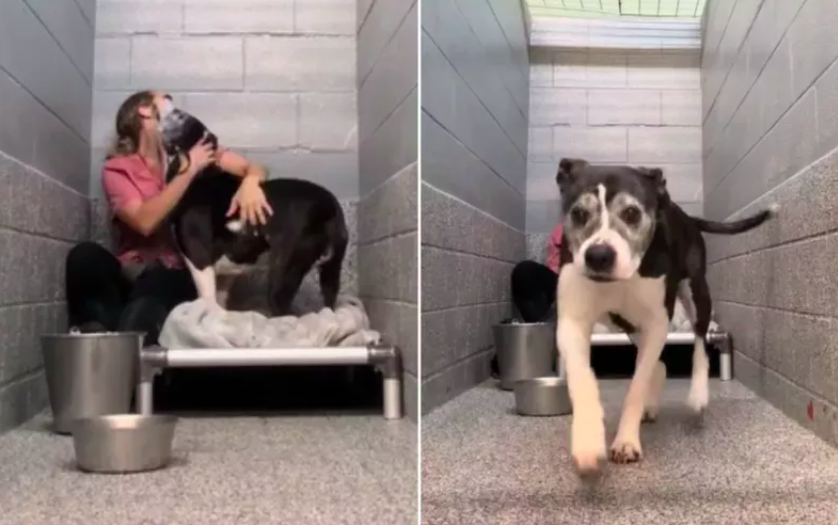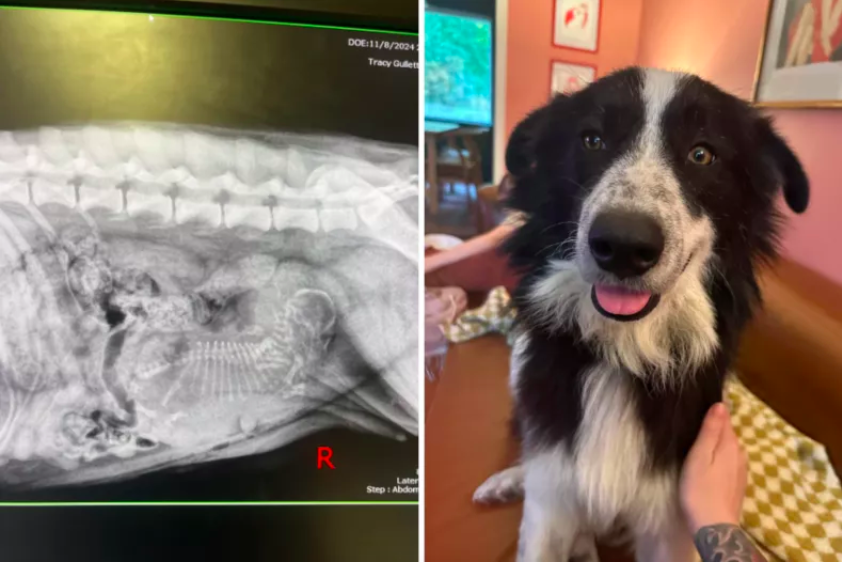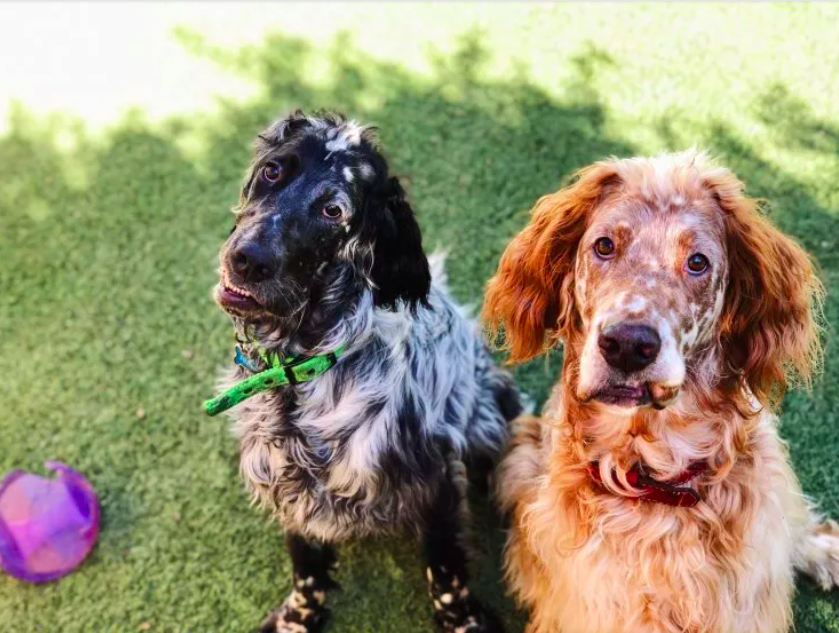Trending Pet Stories
Golden Retriever Thrives With New Puppy Sibling: Myths Debunked

Golden Retriever Thrives With New Puppy Sibling: Myths Debunked
Welcoming a new puppy into a home with an existing dog can be both exciting and nerve-wracking. Many owners have concerns about how their older dog will react to the new addition, fearing jealousy, stress, or behavioral issues. However, the story of a Golden Retriever embracing a new puppy sibling demonstrates that these worries are often unfounded.
In this comprehensive article, we’ll explore the benefits, challenges, and strategies for successfully integrating a new puppy into a home with an older dog, focusing on the heartwarming and educational aspects to help ease any concerns.
Understanding Canine Socialization
Natural Pack Animals
Dogs are inherently social creatures, often thriving in a pack environment. This natural inclination towards companionship means that, with the right approach, introducing a new puppy can enrich the lives of both dogs.
The Role of Socialization
Socialization is crucial for dogs of all ages. For an older dog, a new puppy can provide fresh opportunities for social interaction, mental stimulation, and even physical exercise, which are essential for their overall well-being.
The Benefits of a New Puppy Sibling
Increased Physical Activity
Golden Retrievers are known for their high energy levels and love for play. Introducing a new puppy can lead to increased physical activity for the older dog, helping to keep them fit and healthy.
Mental Stimulation
A new puppy brings novelty and excitement into the household. The older dog will be challenged and mentally stimulated by the new behaviors and energy of the puppy, which can help prevent cognitive decline.
Enhanced Social Bonds
Dogs form strong social bonds not only with humans but also with other dogs. A new puppy can become a close companion for the older dog, reducing feelings of loneliness and promoting a sense of security.
Common Concerns and Misconceptions
Fear of Jealousy
One common concern is that the older dog will feel jealous or neglected. While it’s natural for any pet to need time to adjust, most dogs can adapt to sharing their space and attention, especially with careful management.
Behavioral Issues
Some owners worry about potential behavioral issues, such as aggression or resource guarding. However, with proper training and supervision, these issues can usually be mitigated.
Health Concerns
Older dogs might have specific health needs, and owners may fear that a playful puppy could inadvertently cause harm. Monitoring interactions and ensuring the older dog’s comfort can address these concerns.
Steps to a Successful Introduction
Preparation Is Key
Before bringing the new puppy home, prepare your older dog for the change. This can include:
- Scent Familiarization: Swap bedding or toys between the dogs to get them accustomed to each other’s scent.
- Establishing Safe Spaces: Ensure both dogs have their own spaces where they can retreat and relax.
- Routine Maintenance: Keep the older dog’s routine as consistent as possible to reduce stress.
The First Meeting
The initial introduction should be handled with care:
- Neutral Territory: Introduce the dogs in a neutral location to prevent territorial behavior.
- Leash Control: Keep both dogs on leashes initially to manage any unexpected reactions.
- Positive Reinforcement: Reward both dogs with treats and praise for calm and friendly behavior.
Ongoing Integration
Continued efforts are necessary to ensure a smooth integration:
- Supervised Playtime: Monitor interactions between the dogs until you are confident they are comfortable with each other.
- Separate Feeding: Feed the dogs separately to prevent food aggression.
- Individual Attention: Spend quality time with each dog individually to reinforce their bond with you and ensure neither feels neglected.
Training and Behavior Management
Basic Obedience
Training both dogs in basic obedience is crucial. Commands like “sit,” “stay,” and “leave it” can help manage interactions and prevent conflicts.
Positive Reinforcement
Use positive reinforcement techniques to encourage good behavior. Rewarding the dogs for calm and friendly interactions helps reinforce positive associations with each other.
Professional Help
If you encounter persistent behavioral issues, consider seeking help from a professional dog trainer or behaviorist. They can provide tailored strategies to address specific problems.
Health and Wellness Considerations
Veterinary Care
Ensure both dogs receive regular veterinary care. This includes vaccinations, parasite prevention, and health check-ups to keep them both healthy.
Diet and Nutrition
Puppies and older dogs have different nutritional needs. Consult your veterinarian to ensure each dog is receiving the appropriate diet for their age and health status.
Exercise and Play
Adjust the exercise routine to suit both dogs. While the puppy will need more frequent play sessions, ensure the older dog also gets adequate physical activity tailored to their energy level and health.
Case Study: Golden Retriever and New Puppy Sibling
Meet Max and Bella
Max, a 5-year-old Golden Retriever, was the sole pet of his household. His owners decided to bring home Bella, an 8-week-old Golden Retriever puppy, to keep Max company. Initially, they were concerned about how Max would react to the new addition.
Initial Reactions
Max was curious but cautious around Bella. The first few days involved a lot of supervised interaction, with the owners ensuring both dogs felt safe and comfortable.
Building a Bond
Over the next few weeks, Max and Bella began to form a strong bond. They played together, shared toys, and even started to sleep near each other. Max’s energy levels increased, and Bella benefited from Max’s guidance and companionship.
Outcome
Today, Max and Bella are inseparable. The initial concerns about jealousy and behavioral issues proved unfounded, and both dogs are happier and healthier together.
Conclusion
Introducing a new puppy into a home with an existing dog, like a Golden Retriever, can be a rewarding experience for both pets. While it’s natural to have concerns, understanding the benefits, preparing properly, and managing the introduction with care can lead to a harmonious and enriching relationship.
Max and Bella’s story is a testament to the positive impact a new puppy sibling can have, debunking common myths and highlighting the joys of canine companionship.
Frequently Asked Questions (FAQs)
How long does it take for an older dog to adjust to a new puppy?
The adjustment period can vary, but most dogs take a few weeks to a few months to fully acclimate to a new puppy. Patience and consistency in managing interactions are key.
What should I do if my older dog shows aggression towards the new puppy?
If aggression occurs, separate the dogs immediately and consult with a professional dog trainer or behaviorist. Gradual reintroduction with positive reinforcement can help.
Can introducing a new puppy help an older dog with separation anxiety?
Yes, having a new puppy can provide companionship and reduce feelings of loneliness, which may help alleviate separation anxiety in an older dog.
How can I ensure both dogs get enough individual attention?
Schedule separate playtime and training sessions with each dog. This ensures both dogs feel valued and helps maintain their individual bonds with you.
Are there any specific breeds that are more compatible with Golden Retrievers?
Golden Retrievers generally get along well with most breeds due to their friendly and sociable nature. However, individual temperament and personality should be considered when introducing a new dog.
We appreciate you for taking the time to read this article!
Finally, we hope you found this article interesting? And what do you think about ”Golden Retriever Thrives With New Puppy Sibling: Myths Debunked!?”
Please feel free to share or inform your friends about this article and this site, thanks!
And let us know if you observe something that isn’t quite right.
Article Source: visit Newsweek.
Trending Pet Stories
Dog Shelter’s Longest Resident: Grandma’s Sweetest Reaction to a Visitor

Dog Shelter’s Longest Resident: Grandma’s Sweetest Reaction to a Visitor
Introduction: A Heartwarming Tale of Resilience
Animal shelters across the U.S. are filled with dogs longing for forever homes, but few stories are as touching as that of Grandma, a 9-year-old boxer-pit bull mix. As the longest-term resident at Junction City Animal Shelter in Kansas, Grandma’s tale highlights the struggles and incredible love senior dogs offer.
In this article, we explore Grandma’s journey, her charming personality, and the challenges faced by older shelter dogs like her.
Grandma’s Arrival: Abandoned but Not Broken
Grandma’s journey began on November 5, 2023, when she arrived at Junction City Animal Shelter as a stray. Shelter staff later found her previous owner, who could no longer care for her. Vanessa Gray, the shelter director, shared:
“Grandma is an older gal with a nurturing demeanor that inspired her name.”
Despite her difficult start, Grandma quickly endeared herself to the shelter staff with her gentle nature and resilience.
Getting to Know Grandma: A Special Soul
Over time, Grandma revealed her unique personality and preferences:
- Loves Cozy Blankets: Grandma enjoys snuggling up in soft blankets.
- Sunbathing Enthusiast: She relishes roaming the yard and soaking up the sun.
- Playful Companion: From fetch to chew toys, Grandma’s playful side shines.
Her affectionate demeanor and love for human interaction make her a perfect candidate for a loving home.
Why Senior Dogs Like Grandma Face Challenges
Sadly, Grandma’s story isn’t unique. Senior shelter dogs often face longer waits for adoption. A 2021 study in the Animals journal found common traits in long-term shelter residents:
- Older age.
- Larger size.
- Belonging to misunderstood breeds.
- Specific needs, such as being the only pet in the home.
For Grandma, her age, size, and breed have created challenges in attracting adopters.
A Viral Moment: Grandma’s Reaction to a Visitor
Recently, Junction City Animal Shelter shared a video of Grandma on TikTok. The clip shows her joyfully interacting with a staff member, eagerly wagging her tail and playing. The caption, “I’m not crying… you’re crying,” perfectly captures the emotional moment.
This viral footage highlights Grandma’s loving nature and proves she’s still full of life, ready for a family to cherish her.
Life in a Shelter: The Toll on Senior Dogs
Shelter life can be tough for older dogs like Grandma. While she handles the noise and routine better than many, the lack of a permanent home takes its toll. Gray shared:
“This is still not the place for any animal, especially a senior. There is so much noise.”
Fortunately, Junction City Shelter doesn’t euthanize animals, giving Grandma the time she needs to find a family.
What Makes Grandma the Perfect Pet?
Grandma is a loving and low-maintenance companion. Here’s what makes her ideal:
- Solo Star: She thrives in homes without other pets.
- Easygoing Nature: Grandma enjoys her independence but loves human attention.
- Perfect for Any Home: Her calm demeanor makes her suitable for families or individuals.
Advocating for Senior Dogs Like Grandma
Grandma’s story represents countless senior dogs in shelters. Adopting an older dog comes with unique rewards:
- Calm Temperament: Senior dogs are often more predictable and relaxed.
- Deep Bonding: Older dogs form strong emotional connections with adopters.
- Gratitude: They often show immense appreciation for their new homes.
How You Can Help
If you’re moved by Grandma’s story, here are ways to make a difference:
- Adopt: Open your heart and home to a senior dog.
- Volunteer: Spend time with shelter animals to brighten their days.
- Donate: Support shelters with supplies or financial aid.
- Share: Spread the word about adoptable senior pets like Grandma.
Conclusion: Grandma’s Forever Home Awaits
Grandma’s journey is a testament to resilience and unconditional love. As the shelter staff work tirelessly to find her the perfect home, her story reminds us of the joy and companionship senior dogs bring.
Could you be the one to give Grandma the life she deserves? Visit Junction City Animal Shelter to meet her today.
FAQs About Senior Dog Adoption
Why adopt a senior dog?
Senior dogs are calm, loving, and often trained, making them excellent companions.
Are older dogs harder to care for?
While they may require more vet visits, their mature temperament often makes them easier to manage than younger dogs.
Can senior dogs adjust to new homes?
Yes! With patience and love, senior dogs adapt quickly and bond deeply with their families.
What challenges do senior shelter dogs face?
Older dogs often struggle with age-related stigma, breed stereotypes, and limited interest from adopters.
How can I help if I can’t adopt?
You can volunteer, donate, or share stories of senior dogs to raise awareness and support their adoption.
We appreciate you for taking the time to read this article!
Finally, we hope you found this article interesting? And what do you think about ”Dog Shelter’s Longest Resident: Grandma’s Sweetest Reaction to a Visitor!?”
Please feel free to share or inform your friends about this article and this site, thanks!
And let us know if you observe something that isn’t quite right.
References: Newsweek Original Article
Trending Pet Stories
Gift Guide 2024: The Best Gifts for Pet Owners
Trending Pet Stories
Routine Spay Appointment Reveals Shocking Secret About Rescue Dog

Routine Spay Appointment Reveals Shocking Secret About Rescue Dog
When a Tennessee woman decided to spay her newly adopted rescue dog, Salem, she never imagined the twist that would follow. In an unexpected revelation, a routine veterinary procedure unveiled a surprising truth that captivated pet lovers online.
Adopting Salem: A New Beginning
Haley Houghmaster and her family adopted Salem, an Australian shepherd and border collie mix, on October 26, 2024. Salem joined their family from Happy Tails Canine Rescue, a Memphis-based organization dedicated to helping stray and abandoned dogs find loving homes. According to Haley, Salem had seamlessly adjusted to her new surroundings, quickly becoming a beloved member of the household.
A Routine Appointment Turned Extraordinary
On November 3, just over a week after Salem’s adoption, Haley brought her to the vet for a spay appointment. What was supposed to be a standard procedure took an unexpected turn.
Once under anesthesia, the veterinarian made an incision and discovered Salem was heavily pregnant—with only one puppy. Haley shared the surprising news on Reddit, where her story quickly gained traction.
“Found out at spay appointment that my new rescue dog is pregnant with one puppy,” Haley captioned her Reddit post, accompanied by Salem’s X-ray image.
What Are Singleton Puppies?
Singleton puppies, or single-litter puppies, are a rarity in the canine world. According to pet experts, this condition can result from several factors, including a dog’s age, genetics, or environmental influences.
Why Are Singleton Puppies So Rare?
- Breed and Genetics: Certain breeds are more prone to single-litter births due to their genetic makeup.
- Stress and Environment: External stressors can influence the size of a dog’s litter.
- Health and Age: Older dogs or those with unique health conditions are more likely to carry fewer puppies.
Risks Associated with Singleton Births
While the thought of a single puppy might seem adorable, it does come with its challenges.
Potential Complications
- Labor Induction Issues: Typically, puppies induce labor by releasing cortisol. With only one puppy, there might not be enough hormone production, which could delay labor and necessitate a C-section.
- Placental Limits: A dog’s placenta is viable for about 63 days. If labor doesn’t occur by day 65, veterinary intervention becomes critical.
- Socialization Concerns: Singleton puppies may miss out on the crucial social interactions provided by littermates, potentially leading to behavioral challenges.
- Lactation Issues: A single puppy may not trigger sufficient milk production, depriving it of colostrum, the nutrient-rich first milk.
Haley’s Decision: Embracing the Miracle
Despite the risks, Haley decided to let Salem carry the pregnancy to term. Terminating at this stage could have posed significant dangers to Salem’s health.
“Since it’s just one puppy, I chose to keep it and let her try to deliver naturally,” Haley explained.
Salem is expected to deliver any day now, and Haley remains optimistic for a smooth delivery.
Expert Insights on Singleton Puppies
Dr. Harunur Rashid, in an article for Vet Advises, emphasizes that while rare, singleton litters are not unheard of. However, veterinarians need to monitor these pregnancies closely to ensure the safety of both the mother and puppy.
Dr. Marty Greer, a veterinarian at Revival Animal Health, notes that C-sections are often necessary in such cases. Without the natural triggers for labor, complications can arise, putting both mother and pup at risk.
A Viral Sensation: Salem’s Story Captures Hearts Online
Haley’s Reddit post resonated with pet lovers worldwide, garnering over 12,000 upvotes and hundreds of comments.
- “Congrats! She looks like a happy momma-to-be,” one user remarked.
- “What a surprise! We had a similar experience with our rescue,” another shared.
- Some cautioned Haley, noting that X-rays aren’t always precise: “Our vet said two puppies, but we ended up with eight!”
Found out at spay appt that my new rescue dog is pregnant with 1 puppy 😅
byu/Pipsmagee2 inDogAdvice
What’s Next for Salem and Her Puppy?
As Salem approaches her due date, Haley and her family are preparing for the arrival of their newest furry family member. They’re hopeful for an uneventful delivery and are excited to meet the puppy who has already captured so much attention.
Conclusion: A Rescue Dog’s Unexpected Journey
Salem’s story is a heartwarming reminder of the surprises life can bring, even in the most routine situations. Her journey from rescue dog to expectant mother has inspired thousands, showcasing the unpredictable beauty of life.
Frequently Asked Questions (FAQs)
What are singleton puppies?
Singleton puppies refer to litters with only one puppy. This condition is rare and influenced by factors such as breed, genetics, and environment.
Can singleton pregnancies be risky for dogs?
Yes, singleton pregnancies can pose risks, including complications during labor and insufficient milk production for the puppy.
How can vets help singleton pregnancies?
Veterinarians closely monitor singleton pregnancies and often recommend C-sections if natural labor doesn’t begin within the expected timeframe.
Why do singleton puppies face socialization issues?
Without littermates, singleton puppies may miss out on critical interactions that help develop their social and behavioral skills.
What should owners of singleton puppies do?
Owners should provide extra care, socialization opportunities, and veterinary checkups to ensure the puppy’s physical and emotional well-being.
We appreciate you for taking the time to read this article!
Finally, we hope you found this article interesting? And what do you think about ”Routine Spay Appointment Reveals Shocking Secret About Rescue Dog!?”
Please feel free to share or inform your friends about this article and this site, thanks!
And let us know if you observe something that isn’t quite right.
References: the original article on Newsweek.
-

 Pet Care2 years ago
Pet Care2 years agoThe Best Dog Collars For 2022
-

 Dogs2 years ago
Dogs2 years agoBichon Frise: The Happy, Playful, and Cuddly Companion
-

 Trending Pet Stories1 year ago
Trending Pet Stories1 year ago2023 ‘World’s Ugliest Dog’ Winner: Scooter’s Tale of Resilience
-

 Animals3 years ago
Animals3 years agoAre There Animals Having Down Syndrome?
-

 Pets2 years ago
Pets2 years agoThe Fascinating World Of The Red Chameleon
-

 Dogs3 years ago
Dogs3 years agoTop 10 Most Popular Dog Breeds According To AKC.
-

 Dogs3 years ago
Dogs3 years ago21 Dog Breeds That Resemble Bears Or Teddy Bears!
-

 Dogs3 years ago
Dogs3 years agoEskimo Dogs from Canada – What Are They? – Find Out!










